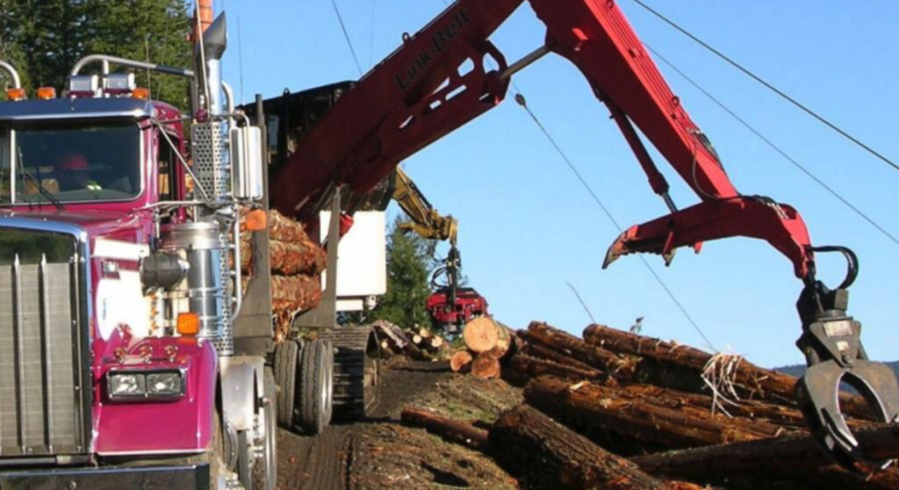Washington’s natural resources agency and a nonprofit group have finalized a $121 million purchase of about 20,000 acres of logging lands in the southwest corner of the state.
The deal, which closed last Friday, is the state’s largest land acquisition in more than a decade, according to the Department of Natural Resources. The department revealed last month that it planned to buy about 9,115 acres of forestland in Wahkiakum County for $55 million that would be managed to generate revenue from timber harvests.
But that property was up for sale at auction as a block that included about 11,000 more acres. The seller was Manulife Investment Management, a firm headquartered in Toronto that says it has assets of around $845 billion Canadian under management.
If the department waited until next year’s legislative session for lawmakers to approve the additional money it needed for the full purchase, it would’ve missed the window to make a bid, explained department spokesman Kenny Ocker. Instead, The Conservation Fund stepped in with $66 million to pay for 11,390 acres.
The state and The Conservation Fund entered into an agreement giving the state the option to buy the land from the nonprofit when money becomes available. In the meantime, The Conservation Fund will manage the acreage it paid for.
The transaction is dubbed the Deep River Woods. The land is located west of Longview.
Lands Commissioner Hilary Franz said it was a “perfect example of what happens when we don’t fight over our forests, but instead come together to fight for them.” She added that the purchase would help support rural communities that depend on the timber industry.
Purchase is tied to land conservation plan
The deal is linked to an announcement Franz made on Monday, where she proposed that 2,000 acres of land in five counties be shifted out of the state’s timber portfolio and into conservation. With that change in status, the land would be protected and no longer open to industrial logging to generate revenue for the state.
Last year, the Legislature approved a budget provision allowing for a land transfer like this up to 2,000 acres. At the same time, that legislation provided $70 million in revenue from the state’s cap-and-trade program to acquire replacement land that can be used for timber production.
The land the natural resources department proposed adding to the conservation column this week is spread across Clallam, Jefferson, King, Snohomish, and Whatcom counties.
The largest tract, about 950 acres, will be preserved in two sites in east Jefferson County, according to the department. Two areas in Whatcom County, totaling 650 acres are also included. As are about 290 acres in Tiger Mountain State Forest, in King County.
“We’re ensuring our working forests keep working for all of us by providing multiple benefits, including carbon sequestration, clean air and water, wood products we depend on for carbon-friendly buildings and critical rural jobs,” Franz said.
Transferring the 2,000 acres of parcels will require the blessing of county leaders in places where the land is located, as well as approval from the state’s Board of Natural Resources.
‘It represents a new approach’
The American Forest Resource Council, an industry group that represents lumber manufacturers and others, slammed the state’s moves.
“Let’s be clear, this is not a climate solution. Using public monies to convert more of Washington’s working lands and forests into no touch ‘set asides’ is more about politics and appeasing anti-forestry groups than it is about science, strategic climate investments, or common sense,” Travis Joseph, the council’s president, said in a statement.
The group said cap-and-trade dollars should be going to areas like reforestation, forest health and wildfire prevention.
Washington Conservation Action noted that it and other environmental groups “fought fiercely” in this year’s session to secure the funding that allowed the 2,000 acres to be set aside. The group said it was still “reviewing the details about whether the selected forestland achieves the intent of the initiative” but called the land transfer a “milestone.”
“It represents a new approach to managing our state lands for multiple benefits, not just timber revenue. We believe this effort could be a win for people, for the climate, for Washington’s unique forestlands, and for logging communities,” the group said in a statement.
All told, the Department of Natural Resources manages roughly 2.4 million acres of forestland, with much of it used for logging to generate money for local governments and public schools. About 1 million acres statewide are designated for conservation.
Trees on the Deep River Woods tracts include Douglas fir, western hemlock and red alder. The trees range in age, with some areas recently harvested and others ready for cutting. Timber on the land will be cleared, replanted and harvested again on decades-long cycles. It’s still being determined how the state will divvy up revenue from the land to schools and other beneficiaries.
Washington has been rapidly losing forestland to development, according to the Department of Natural Resources, and for the first time in history, the state is less than 50% forested.
The Washington State Standard is a nonprofit, nonpartisan news outlet that provides original reporting, analysis and commentary on Washington state government and politics. We seek to keep you informed about Washington’s most pressing issues, the decisions elected leaders are making, how they are spending tax dollars and who is influencing public policy.



